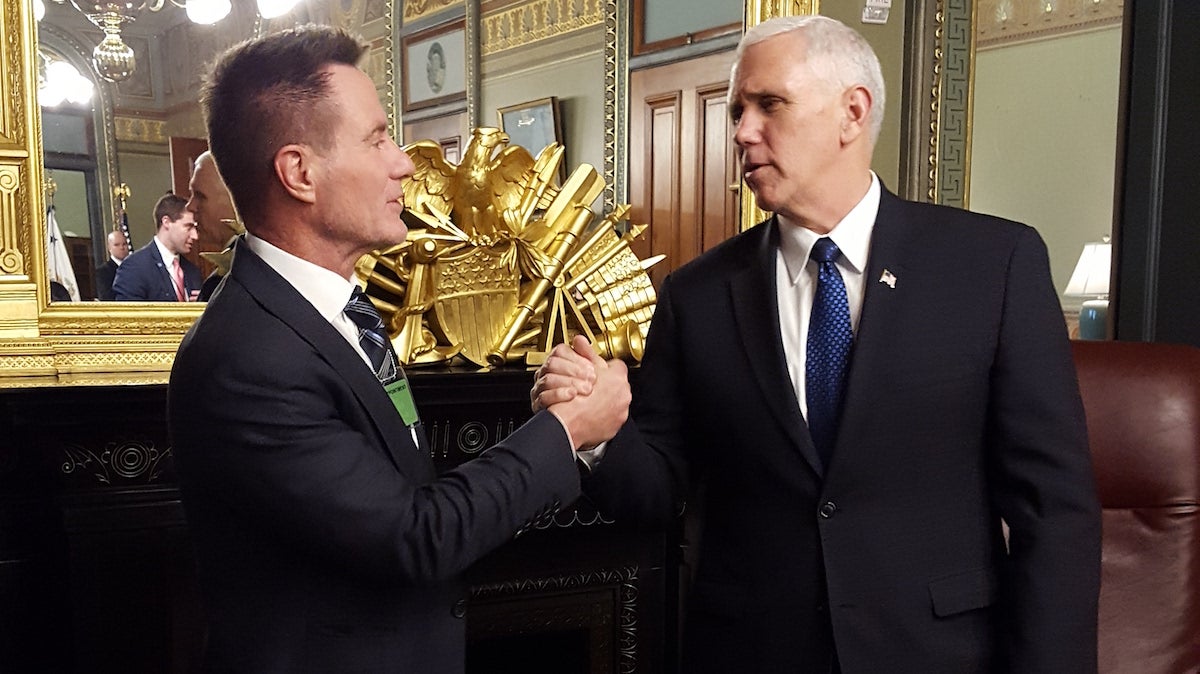Bucks County advocates heartened by ‘Right to Try’ support from the White House

Bucks County "Right to Try" advocate Matt Bellina recently met with White House officials such as presidential counselor Kellyanne Conway to discuss legislation that would give terminally ill patients greater access to experimental treatment. (NAC)
When Bucks County health club owner Jim Worthington offered to host a campaign rally for then-presidential candidate Donald Trump, it came with strings attached.
“One of the main reasons we wanted a rally was we wanted to get in front of him, to ask him where he stood on the Right to Try,” he said. “Right to Try” is the name of a movement to let terminally ill patients try out experimental treatments with minimal clinical testing.
Worthington liked what he heard from Trump then, and now he and local advocates of Right to Try have gotten a boost from the White House.
 Bucks County resident Jim Worthington meets with Vice President Mike Pense to discuss “Right to Try” legislation on February 7, 2017. (NAC)
Bucks County resident Jim Worthington meets with Vice President Mike Pense to discuss “Right to Try” legislation on February 7, 2017. (NAC)
Last week, Worthington and several other local advocates for Right to Try met with Vice President Mike Pence in Washington, D.C. Afterwards, the White House release a statement about the meeting.
“Vice President Pence reiterated his belief that a Right to Try law is fundamentally about restoring hope and gives patients with terminal illnesses a fighting chance by giving them access to experimental drugs that have already passed the FDA’s safety review process,” it said. As governor of Indiana, Pence signed a state Right to Try bill into law.
With powerful people in his corner, Worthington said he feels heartened “that people are actually listening at that level.”
So far, 33 states have passed laws their own Right to Try laws, patterned on model legislation promoted by the Goldwater Institute, a libertarian think tank. On February 7, Bucks County Republican congressman Brian Fitzpatrick co-introduced federal Right to Try legislation in the House of Representatives, saying “it is time for this body to come together with federal regulators and industry leaders to clear the path forward, to take care of those brave Americans who are fighting simply for a chance to live.”
By bypassing most clinical trials, advocates say, terminally ill patients could find hope and maybe even a viable treatment option.
“There’s no risk. At that point, you would want to take anything,” said Worthington. “Particularly if it’s not going to harm you.” Right to Try legislation specifies that patients would only have access to experimental treatments as advised by a physician, and only those that have passed Phase I clinical testing, during which basic safety and side effects are vetted.
With possibility of federal Right to Try legislation on the horizon and the White House signalling its support, some medical ethicists and doctors see potential pitfalls.
State level Right to Try laws have not meant dramatically greater access to experimental drugs, and the wording of the federal bill does not address who would bear the costs of such treatments.
Many advocates for Right to Try are living with amyotrophic lateral sclerosis, or ALS, a progressive neurodegenerative disease, including Bucks County’s own Matt Bellina and Frank Mongiello, who testified before Congress last year. It’s also sometimes called Lou Gehrig’s Disease.
ALS physician and Director of the Center for Neurodegenerative Disorders at Temple University, Terry Heiman-Patterson, said she sees the frustration of living with a disease for which there is no cure every day.
“My heart goes out to them. I do get it. I care so much that at the end of the day we get the right answer,” she said.
Her fears about Right to Try range from the possibility that it would siphon patients away from clinical trials, making it harder for researchers to do the intense clinical testing needed to find treatments for all, to the potential for untried drugs to kill terminally ill patients faster and more painfully.
WHYY is your source for fact-based, in-depth journalism and information. As a nonprofit organization, we rely on financial support from readers like you. Please give today.

